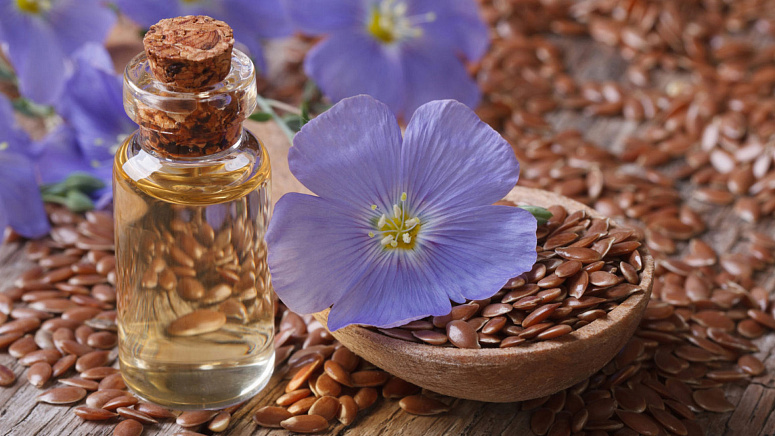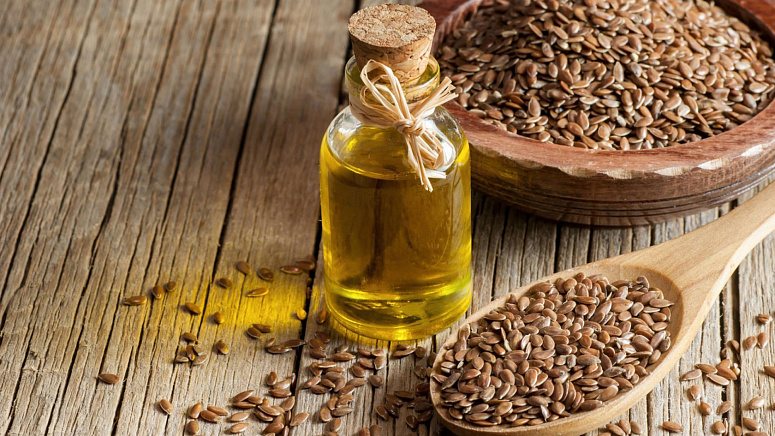Warning: This article is rooted in the principles of Ayurveda and is intended for informational purposes only. It is not a substitute for professional medical advice, diagnosis, or treatment. Before making any changes to your diet or lifestyle, especially if you have a chronic condition, please consult your healthcare provider or a certified nutrition specialist.
Oil plays a key role in Ayurveda practice. This ancient science of healing uses oils not only to treat illness but also for prevention. In order to balance the three doshas, flaxseed oil is actively used in practice. The beneficial properties of flaxseed oil were discovered by the ancient sage Charaka and described in detail in his work. Which of these properties can modern people take advantage of? Is it advisable to consume flaxseed oil or should it be limited to external application?
Beneficial properties of flaxseed oil
Not only ancient sages, but also modern scientists speak of the health benefits of flaxseed oil. Over 50% of flaxseed oil is made of unsaturated fatty acids and it contains large amounts of omega-3 and omega-6 fats.
These types of fats, according to modern science, are considered healthy and polyunsaturated. A deficiency of polyunsaturated fats in the body leads to feelings of apathy and lethargy. Unfortunately, our bodies are unable to produce these fats on their own and must receive them from external sources in order to function properly.
A deficiency in omega-3 leads to blood thickening in the body, which often causes blood to clot. This, however, can be reversed with flaxseed oil; as the Charaka Samhita states, “flaxseed oil thins the blood.” The omega-3 content (53g per 100g of oil) prevents blood from thickening, thus decreasing the risk of heart disease associated with blood clots. By improving vascular elasticity, the oil also reduces the risk of heart attacks and strokes.
Flaxseed oil can be beneficial for those trying to lose weight. Its composition improves digestive function and promotes the burning of excess fat. The oil is especially beneficial for those who have given up meat.
For those with a plant-based diet, flaxseed oil is an essential source of omega fatty acids. This oil is also beneficial for women during menopause due to its estrogen content. Men shouldn’t be skeptical of flaxseed oil either, since it helps produce testosterone, the male hormone which helps muscles become stronger and more resilient.
Everyone interested in natural anti-aging techniques should also consider flaxseed oil. Its alpha-tocopherol content promotes cell regeneration, initiating the body’s rejuvenating process. Flaxseed oil is indispensable for those who often experience stress and depression; the linoleic acid in the oil helps restore damaged nerve cells and soothe the body.
It is also worth noting that the omega-6 lipids improve brain function and memory. Still, a logical question may arise: is flaxseed oil ever harmful? Yes, if you have individual intolerance or acute cholecystitis.
Charaka said that flaxseed oil absorbs the properties of the foods it touches. Therefore, if your diet includes many foods rich in omega acids or if you consume fish oil, it is best to avoid flaxseed oil - excess omega-3 and omega-6 can lead to heart problems. Flaxseed oil should also be avoided in the case of diarrhea or food poisoning.
The use of flaxseed oil in Ayurveda
Having examined the benefits of flaxseed oil in detail, we suggest you familiarize yourself with ways to use it to help yourself and your loved ones.
Before using flaxseed oil in food, always remember Charaka’s words: flaxseed oil absorbs the properties of the foods it touches, amplifying their influence on the body. It is also important to remember that, in Ayurveda, flaxseed oil lowers vata-dosha while increasing pitta and kapha.
Flaxseed oil is quite caloric, so it is best to consume it in moderation; the maximum daily intake is around 3 tablespoons. The oil is easily digested, so it can be used to dress any salad, but it loses its beneficial qualities at high temperatures. Therefore, it shouldn’t be used to fry, boil, or otherwise heat any foods.
Avoid using rancid oil, as it can be harmful to the body. Flaxseed oil cannot be stored for long periods of time, or it will lose its beneficial properties and become unusable. Fresh oil may have a fish oil-like odor, a smell painfully familiar to many from childhood. This is acceptable, though higher-quality oil tends to be odorless. Before consuming oil or using it for cosmetic procedures, take a few drops in your mouth and swish it around. The oil should leave no aftertaste; if it does, or if the oil has bitter notes, do not use it.
To prevent illness and strengthen the immune system, Ayurveda recommends taking 1 teaspoon of oil in the morning on an empty stomach. You can also take another tablespoon 30 minutes before meals. It is recommended to take the oil this way for 2 months, after which you should take a break and continue taking the oil as directed if you’re using it as a source of omega fats. The dosage can be increased or decreased according to a specialist’s advice.
If you wish to lose weight, increase the above regimen by taking one dessert spoon of flaxseed oil 10 minutes before your evening meal. If your goal is to cleanse the blood vessels, Ayurveda recommends taking one tablespoon of oil twice daily over the course of three months.
For those wishing to combat dry skin, Ayurveda suggests adding 2-3 teaspoons of flaxseed oil to finished dishes. Furthermore, Ayurveda offers recipes for the proper application of oil to the skin. Remember that, although flaxseed oil is suitable for all skin types, it’s important not to apply it to the affected area.
Ideally, apply a few drops of oil to a cotton pad and use it to wipe your face. This will cleanse the pores and moisturize the skin. Make sure to repeat this twice daily, and you’ll see the first results in several weeks. It is best to apply oil to the skin with your fingers, using gentle massaging movements as recommended by Ayurveda. However, a cotton pad is better for delicate skin.
For boils and abscesses, you can make a compress by folding a thin strip of gauze six times, soaking it with the oil, and applying it to the inflamed area for 30 minutes twice daily. Before using oil to treat more serious conditions, please consult a doctor or Ayurvedic specialist.
The views expressed are based on traditional Ayurvedic texts and do not constitute medical advice.

